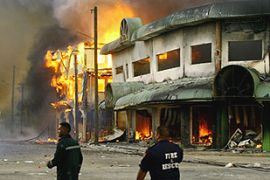Tonga declares state of emergency
Tonga declares a state of emergency after eight people are killed during rioting.

Published On 18 Nov 2006
Eight bodies were found in the ruins of two burned-out buildings in the capital Nuku’alofa’s main business district on Friday.
Armed police and soldiers sealed off the area that foreign diplomats said had been 80 per cent destroyed.
King distressed
A statement issued by the country’s lord chamberlain said King Siaosi Tupou V was “greatly distressed that a small but dangerous criminal element” had caused deaths, injury and extensive property damage.
He said: “His Majesty’s government is taking decisive action to restore law and order to the kingdom.
“Every measure of the law will be followed to track down and prosecute the perpetrators and those who incited and agitated this mindless criminal destruction.”
The death toll from the riots rose to eight late on Friday when two bodies were found in the wreckage of one of the first buildings torched, a supermarket owned by Feleti Sevele, the country’s prime minister.
Earlier six bodies had been found in the debris of a burned-out office building.
They were believed to be rioters and looters who became trapped in the fire.
Foreign troops
Tonga’s cabinet met in an emergency session late on Friday with Sevele expected to announce a request for Australia and New Zealand to send up to 200 troops and police.
The foreign military personnel were expected to secure the main airport and key infrastructure.
Both New Zealand and Australia, the regional powers in the South Pacific, put troops on standby Friday, but officials from both governments refused to confirm if any formal request for help had been made.
Earlier, Alexander Downer, Australia’s foreign minister said both countries were standing by to respond to a Tongan call for help.
He said: “We have prepared defence force personnel in Australia to go to Tonga if necessary and the New Zealanders have done the same.”
Democratic demands
The unrest erupted when the legislative assembly met for the last time this year and looked likely to adjourn without making a decision on expanding democracy.
Calm was restored after the emergency meeting of the cabinet, nobles and elected commoners agreed to the pro-democracy demands.
Legislators elected by popular vote will represent the majority in parliament at the next election in 2008, ending centuries of rule by nobles and people appointed by the royal family.
Two months ago, the new king pledged to make “appropriate changes” without promising absolute democracy after succeeding his father, King Taufa’ahau Tupou IV, who died on September 10 after a long illness.
Source: News Agencies